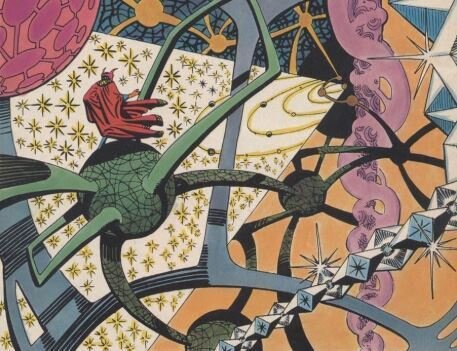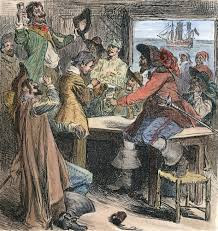A massive Andross-like polygonal face sticks out of a wall. It looks to be made of the same masonry as the rest of the room. The face is a sentient being known as the Master of the Wall.
Add him to your wandering monster list in your dungeons. If the players find him, he will not be “wandering” in the traditional sense, but instead will occupy the room the players find him in. He will only appear in a single room per floor of the dungeon, likely in an inconvenient position blocking a door or passage.
The first time the players encounter him, he will greet them cordially but insist that they treat him like a lord—bow before him, address him as “master” or “my lord” or whatever. He will make a request of the party every time they encounter him. If the party satisfies the request, he will thank them and melt back into the wall, laughing all the while and revealing whatever it was he was blocking.
Here are the requests listed in the order he will ask them:
- “I hunger for meat! Prepare me a feast!” The master of the wall will eat just about anything as long as it is prepared and presented in an extravagant manner. If you want to go off of numbers, he needs 6 HD worth of meaty monsters (skeletons or constructs) to be satisfied. He will let the characters know if they haven’t brought him enough food—”More! More!” He eats by slurping up food with his tongue.
- “I yearn for beauty! Show me something as magnificent as me!” This can include holding a mirror up to the Master or sketching his face.
- “Dance for me!” This requires nothing of the characters other than their willingness to make a fool of themselves in front of each other and the Master. Some daring DMs would have the players themselves get up and dance, but if that’s not your speed the Master will spend a turn laughing and making increasingly elaborate demands of the characters. Afterward, the characters must spend a turn resting.
- “I want a change of scenery! Do something to liven my domain!” Move in some furniture, spread around some treasure, etc. The Master cares more about the presence of new stuff than he does whether or not they fit ambiance. Players can hang drapes from a wall and he’d be happy. He is satisfied once 1000 gp worth of treasure and furniture is moved into the room.
- “Offer before me a magical item!” The item must be something that’s not a consumable. The Master will lick it, draining it of it’s magic power.
- The final request: The Wall Master will ask the PCs to place their hands upon his face. Whoever decides to do so will feel a disorienting nausea that quickly fades into a hazy feeling not unlike being slightly buzzed. They become a Friend of the Wall.
The Master of the Wall will never be immediately hostile to the characters, but will attack them if provoked or if they initiate combat.
Master of the Wall
HD 10 AC none (all attacks directed at it automatically hit) Morale 8. All nonmagical attacks deal only 1 point of damage except from bludgeoning weapons, which only do half damage. Called shots can be attempted against his eyes or mouth, which have an AC equivalent to plate and deal full damage. The Master takes double damage from explosives.
When the Master of the Wall attacks, roll 1d6
- Nose tentacle. A thin and green tentacle with gross feelers along its underside creeps out of the Master’s nose. Range 60’, 1d4 damage and on a hit the target is grappled and immobilized. Pulling the tentacle out of the nose requires a successful strength test and deals 10 damage to the master.
- Eye laser. A fat red beam shoots out of one of the Master’s eyes. Range 120’ 1d6 damage. The laser can be bounced off of reflective surfaces.
- Stinking breath. The master exhales a billowing cloud of reeking yellowish fog. Everyone in a 20’ radius of it must save vs. poison or drop what they’re holding and spend the next round coughing and wheezing. The fog persists for two rounds, and anyone that starts or ends their turn in it takes 1 point of damage.
- Tongue lash. The master flicks his fleshy, vascular tongue. Range 10’, 1d8 damage. If nothing is in range, he just laughs pompously.
- Exhale. The master blows mightily. Everyone must succeed on a strength test or be blown back 20’ feet.
- Forehead ray. A glowing violet orb forms in front of the master’s forehead. He spends one round charging up, and the next round blasts a ringed beam of angry purple light from the orb. Target saves vs. death ray or disintegrates.










